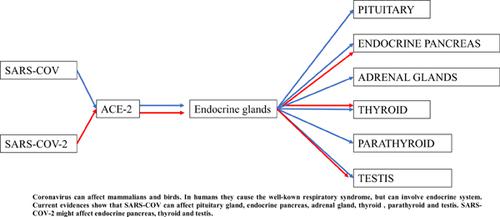Endocrine, Metabolic & Immune Disorders - Drug Targets ( IF 2.0 ) Pub Date : 2021-06-30 , DOI: 10.2174/1871530320666200905123332 Matteo Parolin 1 , Matteo Parisotto 2 , Francesca Zanchetta 2 , Paola Sartorato 3 , Ernesto De Menis 1

|
Coronaviruses are a big family of viruses that can infect mammalians and birds. In humans they mainly cause respiratory tract infections, with a large spectrum of severity, from mild, self-limited infections to highly lethal forms as severe acute respiratory syndrome coronavirus (SARS-CoV), Middle East respiratory syndrome coronavirus (MERS-CoV) and Coronavirus Disease 2019 (COVID-19). Scanty data are reported for the involvement of endocrine glands in human coronaviruses, in particular SARS-CoV-2. In this review, we summarize endocrinological involvement in human coronaviruses, including data on animal coronaviruses. Avians, ferrets and bovine are affected by specific coronavirus syndromes, with variable involvement of endocrine glands. SARS-CoV and SARS-CoV-2 use angiotensin-converting enzyme 2 (ACE2) as a target receptor, so ACE2 plays a central role in viral transmission and initial organ involvement. Autoptic studies on SARS patients revealed that thyroid, parathyroid, pituitary gland, endocrine pancreas and especially adrenals and testis could be impaired by different mechanisms (direct damage by SARS-CoV, inflammation, vascular derangement and autoimmune reactions) and few clinical studies have evidenced functional endocrine impairment. Only few data are available for COVID-19 and gonads and endocrine pancreas seem to be involved. International endocrinological societies have brought some recommendations for the COVID-19 pandemic, but further studies need to be performed, especially to detect long-term hormonal sequelae.
中文翻译:

冠状病毒和内分泌系统:对证据和阴影的系统评价
冠状病毒是一大类病毒,可以感染哺乳动物和鸟类。在人类中,它们主要引起呼吸道感染,严重程度从轻度、自限性感染到高度致命的形式,如严重急性呼吸综合征冠状病毒 (SARS-CoV)、中东呼吸综合征冠状病毒 (MERS-CoV) 和2019 年冠状病毒病 (COVID-19)。关于内分泌腺与人类冠状病毒,特别是 SARS-CoV-2 相关的数据很少。在这篇综述中,我们总结了人类冠状病毒的内分泌学参与,包括动物冠状病毒的数据。鸟类、雪貂和牛受到特定冠状病毒综合征的影响,内分泌腺的参与程度各不相同。SARS-CoV 和 SARS-CoV-2 使用血管紧张素转换酶 2 (ACE2) 作为靶受体,因此 ACE2 在病毒传播和初始器官受累中起着核心作用。对 SARS 患者的尸检研究表明,甲状腺、甲状旁腺、垂体、内分泌胰腺,尤其是肾上腺和睾丸可能受到不同机制的损害(SARS-CoV 的直接损害、炎症、血管紊乱和自身免疫反应),很少有临床研究证明其具有功能性内分泌失调。COVID-19 的可用数据很少,似乎涉及性腺和内分泌胰腺。国际内分泌学会针对 COVID-19 大流行提出了一些建议,但还需要进行进一步的研究,尤其是检测长期的激素后遗症。垂体、内分泌胰腺,尤其是肾上腺和睾丸可能受到不同机制的损害(SARS-CoV 的直接损害、炎症、血管紊乱和自身免疫反应),并且很少有临床研究证明功能性内分泌损害。COVID-19 的可用数据很少,似乎涉及性腺和内分泌胰腺。国际内分泌学会针对 COVID-19 大流行提出了一些建议,但还需要进行进一步的研究,尤其是检测长期的激素后遗症。垂体、内分泌胰腺,尤其是肾上腺和睾丸可能受到不同机制的损害(SARS-CoV 的直接损害、炎症、血管紊乱和自身免疫反应),并且很少有临床研究证明功能性内分泌损害。COVID-19 的可用数据很少,似乎涉及性腺和内分泌胰腺。国际内分泌学会针对 COVID-19 大流行提出了一些建议,但还需要进行进一步的研究,尤其是检测长期的激素后遗症。COVID-19 的可用数据很少,似乎涉及性腺和内分泌胰腺。国际内分泌学会针对 COVID-19 大流行提出了一些建议,但还需要进行进一步的研究,尤其是检测长期的激素后遗症。COVID-19 的可用数据很少,似乎涉及性腺和内分泌胰腺。国际内分泌学会针对 COVID-19 大流行提出了一些建议,但还需要进一步研究,尤其是检测长期激素后遗症。










































 京公网安备 11010802027423号
京公网安备 11010802027423号